This year in Jewish movies was cut a bit short, due to theaters closing in March amidst the spread of the coronavirus. However, the start of 5780 brought us Taika Waititi’s Hitler (a true joy), Tiffany Haddish’s bat mitzvah (an even bigger joy), and the Safdie Brothers’ vision of Jewish New York starring Adam Sandler (honestly, not a joy, just stressful). And we also got some gems to stream from our very own homes. We’re grateful for the diversity of Jewish voices on the big screen this year. Without further ado, the Almas for Jewish movies go to….
JUMP AHEAD: THE BEST FILMS / THE BEST MOVIE STARS / MISCELLANEOUS
The Best Films
The Best Jewish Movie
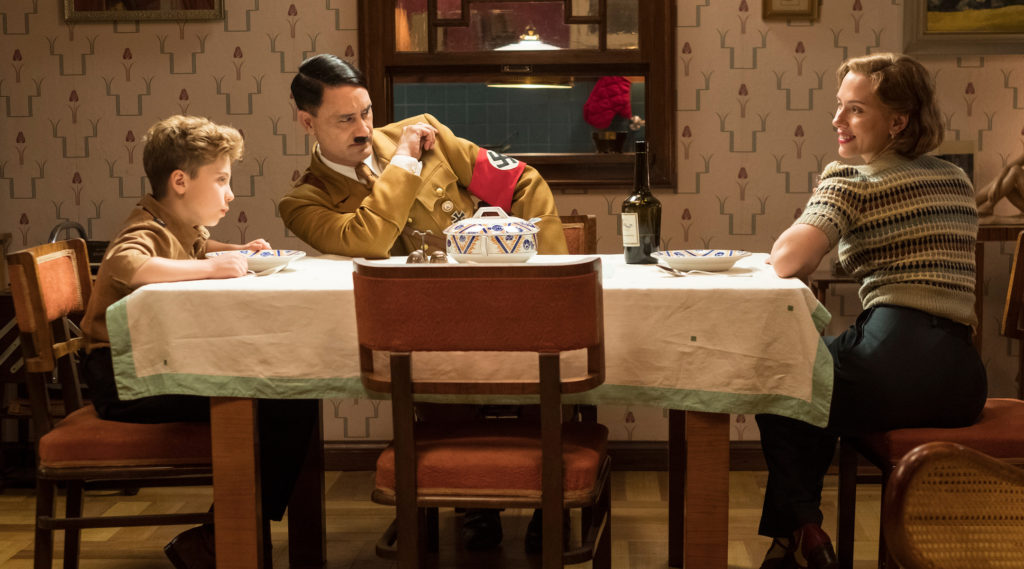
While it may feel like a century ago that the “anti-hate” satire Jojo Rabbit premiered in theaters, in reality it was the beginning of November 2019, making the film eligible for The Almas 5780. And Jojo Rabbit takes the top prize for best Jewish movie for a few reasons:
- Taika Waititi
- Taika Waititi
- Taika Waititi’s mom
- Did we say Taika Waititi?
- Taika Waititi
But for real: Jojo Rabbit was written and directed by Waititi, a Māori Jew, who also stars as an imaginary Hitler in the film. Because, as he tweeted, “What better way to insult Hitler than having him portrayed by a Polynesian Jew?” And, as Mel Brooks said, “If you can reduce Hitler to something laughable, you win.” In this, Waititi absolutely wins. Jojo Rabbit picks up on two key Jewish ideas: using humor to deal with tragedy, and dancing as freedom.
“I experienced a certain level of prejudice growing up as a Maori Jew,” Waititi writes in the film’s production notes. Making the film in 2019 “has been a reminder, especially now, that we need to educate our kids about tolerance and continue to remind ourselves that there’s no place in this world for hate. Children are not born with hate, they are trained to hate.” In Jojo Rabbit, we are reminded of how people learn to hate, and how we can triumph over it.
The Best Jewish Stand-Up Special
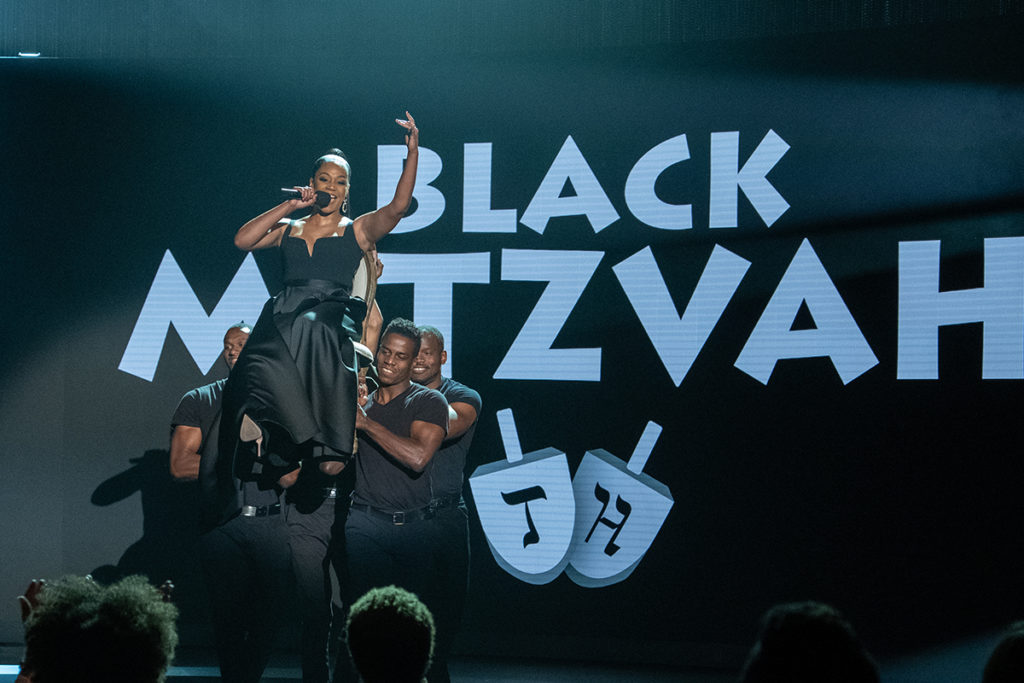
Tiffany Haddish’s Black Mitzvah wins this award by a long shot. The Netflix special, released on the day Haddish celebrated her actual bat mitzvah, was essentially one long d’var Torah, with the Jewish comedian telling viewers what she has learned over the years.
“When I came up with the concept for my special,” Haddish told Alma, “I was trying to figure out a way to tell my truth, my experiences in life, and also maybe open other people’s eyes to the fact that in African American culture, there is nothing that says, ‘Okay, you’re officially a woman,’ or, ‘You’re officially a man.’ There’s no ceremony. There’s no rite of passage. I remember having this debate with my friends about this. One of my homeboys said, ‘You know, I’ve been to jail like three times, I’m a man.’ Going to jail — I don’t think that makes you a man. Knowing who you are, knowing where you come from, that’s what makes you an adult. And being able to share your story. That’s what I love about Judaism, because it’s all about sharing your stories and questioning and learning from each other.”
It’s wonderful, and we’ll be thinking about the joy of her bat mitzvah — and what the representation means to Black Jews — for a long, long time.
The Best Jewish Short Film
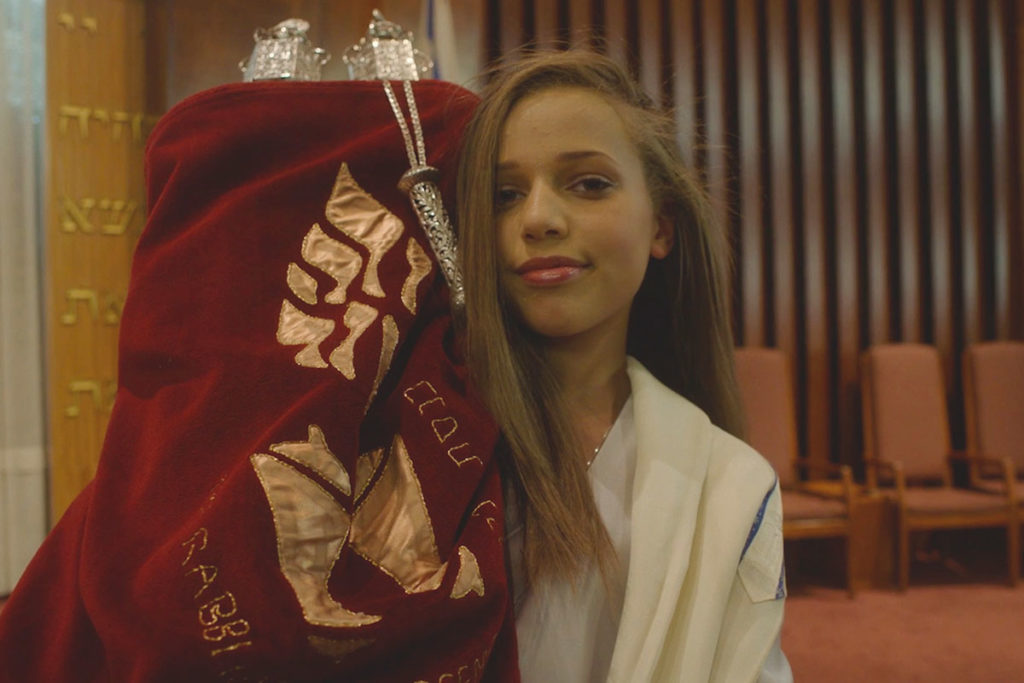
This one goes to Broken Bird, a film about Birdie, a Black Jewish girl studying for her bat mitzvah. Heavily drawn from creator Rachel Harrison Gordon’s experiences, the powerful short tells a coming-of-age story in a way we’ve never before seen on screen. When Gordon chatted with Alma about the film, she said of growing up Black and Jewish, “I straddled many lines, and was in a position where I felt I had to choose, in a binary way, who to be. I think that’s a painful process because it involves subduing thoughts and feelings — a lot of processing and growing up. I think I’m having a coming-of-age moment now as I approach 30 because I’m starting to feel comfortable in my own skin, to express myself in a less censored and filtered way.” And we’re so grateful for that.
The Best Rallying Cry for Jews
Look, we didn’t expect the feature length adaptation of Zach Galifianakis’ Between Two Ferns to make it to the Almas either, but thanks to Paul Rudd, here we are. In a moment that will forever change how we view the phrase “practicing Jew,” the Jewish actor (who does not age) gave us a surprisingly deep one-liner:
“Are you practicing?” Galifianakis asks.
“No, I’m not a practicing Jew…” Rudd says, looking over his right shoulder to the fern and then whipping his head back around to complete the line with a knowing smirk: “I perfected it.”
As Molly Tolsky wrote in Alma, “We, all of us, are perfect Jews. We are all made in the image of God, after all. And that goes for those of who aren’t even sure if we believe in God (hiiiii). A Jew is a Jew is a Jew, no matter how you ‘practice’ it or not. And so I find the concept of actually being ‘perfect’ at Judaism, wherever you are on the sliding scale of observance, incredibly empowering.”
The Best Bat Mitzvah Dress Scene
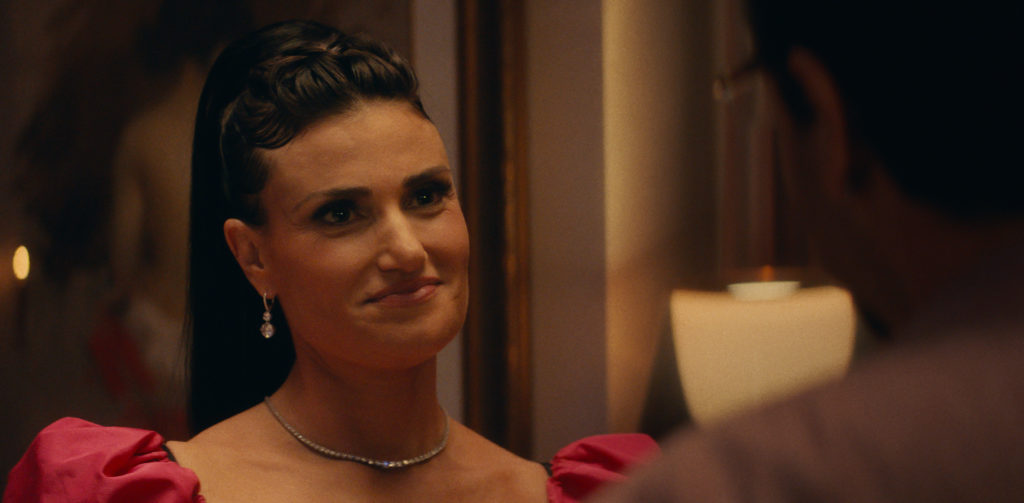
Uncut Gems was many things: a dizzying, stylized look into Manhattan’s Diamond District; a chance for Adam Sandler to showcase his dramatic chops; that which gave us this very good gif; and the best bat mitzvah dress scene of 5780.
The moment comes courtesy of Jewish actress Idina Menzel, whose sharp, brilliant scenes were the breath of fresh air needed to get through such a stressful movie. The entire Passover seder scene will go down as one of the most iconic Jewish moments in film history, but we just can’t get over the part where, following dinner, Menzel, who play’s Howard’s (Sandler) wife, tries on her old bat mitzvah dress — pink puffy sleeves and all. It fits!
It’s during this scene we also get one of the most heart-wrenching, painful conversations between the couple whose marriage is falling apart, made all the more memorable by the fact that she is wearing! Her! Bat! Mitzvah! Dress! A+ for costume design.
The Best Post-Credits Scene
Another incredibly Jewy movie that made its debut post-COVID was the first feature film release from HBO Max: An American Pickle. The movie, which spurred a thousand think pieces before it was even released (and made all the more controversial after it’s Jewish co-creator and star Seth Rogen aired his feelings about Israel), is a story of immigration, assimilation, the power of Jewish prayer and ritual, and the struggle of the American secular Jew.
By no means a perfect film, it did have a perfect post-credits scene: Now bonded with his great-grandfather who was brined in a pickle vat for 100 years and plopped into modern-day Brooklyn, Ben Greenbaum decides to catch Herschel up on some essential Jewish pop culture from the previous century. Which yes, means they are watching Yentl, the Barbra Streisand film about a Jewish woman in Poland who wears drag in order to study Talmud.
It’s a beautiful Jewish pop culture cross-over moment, followed by the most charming dialogue:
“I like her very much,” Herschel says to Ben. “What is her name?”
“Barbra Streisand,” Ben answers. “Babs.”
“She very pretty,” Herschel replies. “She is a Jew?”
“Oh yes,” Ben says. “She is a Jew. Very much Jew.”
The Best Movie Stars
Breakout Actress

Jurnee Smollett has been in the public eye since she was 5 years old, appearing as Michelle’s best friend on Full House. But, 5780 was Jurnee’s year thanks to a scene-stealing role as Dinah/Black Canary in Harley Quinn: Birds of Prey. For one, she made history as the first Black woman to portray the superhero Black Canary. As Smollett herself said, “She was written over 70 years ago and the Black Canary is one of the most iconic characters in the DC universe. So it was an honor to be the vessel through which she was brought to film.” Plus, Smollett also stole the spotlight in the HBO series Lovecraft County. Which yes, is a TV show, and this is a movie category, but it just goes to show us: This was her year.
Breakout Actor
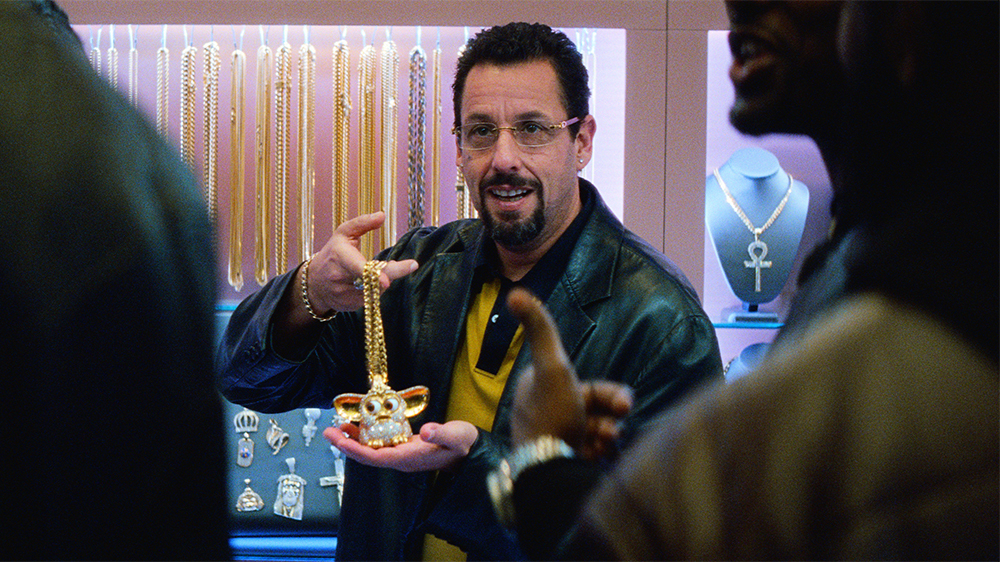
Can a man break out at age 53 after already starring in over 50 movies? Well, maybe if you’re Adam Sandler and we’re giving you the award for breaking out with a completely different kind of role: Howard, a gambling-addicted Jewish diamond dealer in the Safdie brothers’ dramatic film Uncut Gems. As Gabe Friedman wrote in JTA, “Through [the film], Sandler is uncannily good. He deploys a subtle but idiosyncratic ethnic New York accent. He oozes an eagerness to please his many clients and the many people he owes money to. He explodes with frustration when conflict caves in on him. Sandler not only keeps up with the film’s frenetic, disorienting pace — he pushes it forward. This is a new level for Sandler, an intense character study that ranks alongside other Oscar-winning performances from years past.”
Too bad the Oscars snubbed him. We would never!
Best Musical Performance
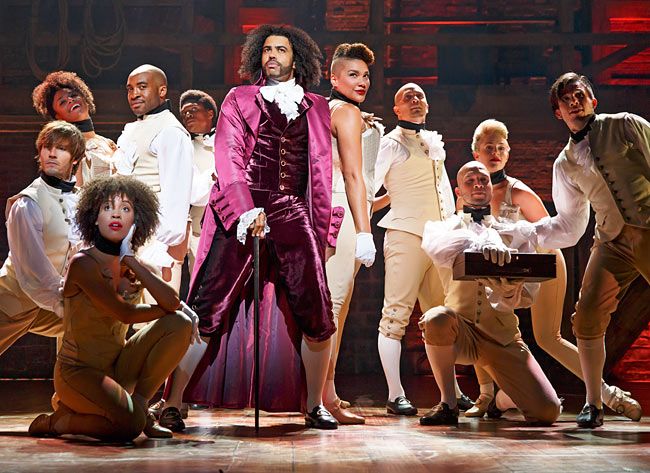
Daveed Diggs in Hamilton blew us all away. And yes, that is a Hamilton pun. While technicallllllly this was filmed in 2016, the Hamilton film was released in July 2020 on Disney+ so we are counting it for this past Jewish year.
Diggs is magnetic. Every time he appears on screen, you can’t look away. In “Guns & Ships,” he raps 19 words, “And I’m never gonna stop until I make ‘em Drop and burn ‘em up and scatter their remains, I’m—” in three seconds, making this couplet (the last “I’m” included) the fastest set of lyrics in Broadway history. Diggs, who plays both Thomas Jefferson and Marqius de Lafayette, has spoken about what it’s like being a Black man who plays a slave owner: “History is about who tells it, and I feel like I’ve been given this opportunity to re-imagine and retell the story.”
Best Acceptance Speech
Did you think we were done writing about Taika Waititi!? Ha. Waititi won Best Adapted Screenplay for writing Jojo Rabbit and accepted the award from fellow Jewish actors Natalie Portman and Timothée Chalamet. Here’s what he said, voice shaking, beginning with thanking his mom for giving him the book the film was based on:
Waititi became the first Indigenous director to win at the Oscars, and the third Indigenous person to ever win an Oscar. At the end of his acceptance speech, Waititi dedicated his award to “all the Indigenous kids in the world who want to do art and dance and write stories. We are the original storytellers and we can make it here as well.” Later in the evening, he made history at the ceremony when he shared a land acknowledgement, a statement that recognizes and pays tribute to the original inhabitants of a specific land. We love to see it!
Best Rachel Weisz
Goes to Andy Samberg! Let us explain.
Last year, in our inaugural Almas, Rachel Weisz won Best Rachel Weisz, naturally. She had a fantastic year — coming off her star (spitting) turn in Disobedience, she wowed us in The Favourite and earned a wide range of nominations. She was everywhere, doing press and red carpet appearances while promoting the film, but we still didn’t learn much more about her personally. She remains elusive, hot, and a superb actor. Therefore, we’re now going to give the Best Rachel Weisz award to the hottest, private, superb Jewish actor. This year? That’s Andy Samberg.
Samberg starred in Palm Springs, the existential crisis film of our generation perfectly suited to our pandemic moment. While he didn’t wear gorgeous gowns on red carpets to promote the film, he did participate in this photoshoot:
Plus, he revealed in another interview that Jewish sister band Haim are “our buddies,” he loves dancing to Women In Music Pt. III with his 3-year-old daughter, and had this perfect take on Portrait of a Lady on Fire: “It blew me away. And I feel like it’s a good movie for men to understand energetically how when they show up it can really change things. It’s not a spoiler to say this. You get lulled into this amazing space of there being no men for a long time in the movie, then a random guy does show up. He’s a nothing character; he’s there to do an errand. He’s not being a jerk or being weird. But him just sitting there eating some slop, you’re like: ‘Ugh, what’s this guy doing here? Get him out of here. He’s ruining the vibe.'”
Without any social media presence (his Instagram account has one post telling people to follow @thelonelyisland instead), we still don’t know much about this man. And maybe that’s why we can continue to adore him.
Miscellaneous
Best Movie-Related Op-Ed
Alma Har’el, our beloved red-haired Jewish Israeli director, wrote a column in Entertainment Weekly after the 2020 Oscars nominations came out. Titled “Alma Har’el slams lack of women in Best Director races — and proposes a solution,” she argues that we should divide the Best Director category into genders: “Why is suggesting separating the directing category to male and female frowned-upon, while Best Actor and Best Actress is agreeable? Are we so naive to assume we would celebrate actresses as much as we do today if acting categories weren’t separate? The status quo will always protect itself by getting women and underrepresented filmmakers to play a game they can’t win. By making us believe that anything other than breaking into the white boys’ club is failure. It is up to us to feel differently and build a new world that celebrates us.”
We’re not totally convinced the idea works — there are people who do not fit into either of those categories! — but we love an outspoken woman taking on the status quo.
“Best” Staten Island Accent by a British Jewish Person
Bel Powley in The King of Staten Island did her best.
“Best” British Accent by an American Jewish Person
As did Beanie Feldstein in How to Build a Girl.
Best Fake Jewish Song
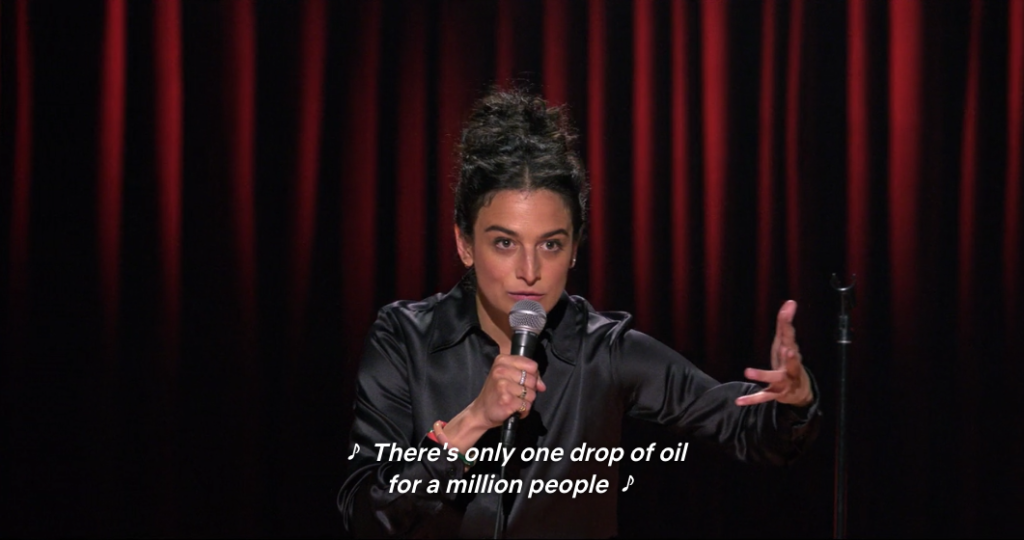
In Jenny Slate’s marvelous stand-up special, Stage Fright, she dives into her Jewish identity. (She even calls the Netflix special a “late-in-life bat mitzvah.”) In one bit, she talks about going to a midnight Catholic mass and being very taken by the Christmas songs: “The Christmas songs, and thinking about it, they’re all just like, ‘jingle jangle! Everybody gets a present! Like, Santa comes down but he never catches on fire. We don’t know how it happens. Everything’s fine. We never worry. That’s not in our culture.’ Like… [confused face].” Then, she describes every Jewish song, singing: They tried to kill us in the past / They’re gonna do it again / Rest for just a moment / There’s only one drop of oil for a million people. Honestly, sounds about right.
Best Animated Torah
Trolls World Tour had an animated Torah and we still don’t know what to make of it. So we’re just going to leave this here:
Worst “Jewish” Movie
Alright, we have to end our Best list with one Worst: Hallmark’s attempt at a Hanukkah film. Holiday Date felt more like a Christmas movie with a brief informational PSA about Hanukkah and not at all what the holiday is really like for many Jews in the U.S. But hey, we have a suggestion for next year.